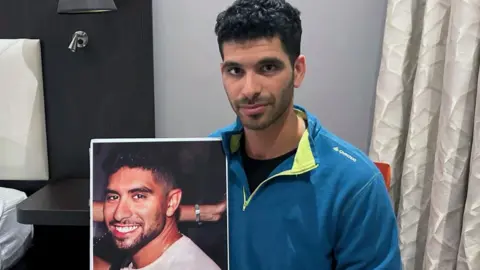In a deeply distressing turn of events, the family of Evyatar David, an Israeli hostage held by Hamas, has come forth with grave accusations against the militant group. They allege that Hamas is deliberately starving their son as part of a propaganda scheme. This shocking assertion comes following the release of a video by Hamas that depicts a visibly emaciated David, who appears to be in a narrow concrete tunnel. The heartbreaking footage captures Evyatar, aged 24, who was abducted during an attack at a music festival in southern Israel on October 7, 2023.
The family’s statement condemning Hamas highlights their anguish: “We are forced to witness our beloved son and brother, Evyatar David, deliberately and cynically starved in Hamas’s tunnels in Gaza— a living skeleton, buried alive,” a reflection of their profound emotional torment and disillusionment. The video released by Hamas portrays him expressing his dire circumstances, stating, “I haven’t eaten for days… I barely got drinking water,” and showing him digging what he claims will be his own grave.
This incident is part of a larger context of violence and hostage situations; during Hamas’s coordinated attack on Israel almost two years ago, they seized a total of 251 hostages. Currently, it’s reported that 49 of those hostages remain in captivity in Gaza, with 27 believed to be deceased.
In light of these harrowing circumstances, Evyatar’s family has implored the Israeli government and the international community to take urgent action to secure his release. They emphasized the desperation of their plea in hopes that it may catalyze further efforts to save him.
The situation in Gaza is fraught with humanitarian challenges, compounded by allegations that Israel is exacerbating the crisis by restricting food supplies during its conflict with Hamas. While aid agencies have accused Israel of contributing to conditions that may lead to famine, Israeli officials reject these claims, asserting that there is “no starvation” occurring and that they are not placing restrictions on aid entering the Gaza Strip. However, such assertions are met with skepticism from Europe and humanitarian organizations that operate in the area.
Recently, the Israel Defense Forces (IDF) have claimed that they are working to enhance the humanitarian response in Gaza, having airdropped 90 food aid packages as part of an organized effort involving nations such as the United Arab Emirates, Jordan, Egypt, France, and Germany. Conversely, the Hamas-run health ministry reported that malnutrition continues to take a toll, with at least seven additional deaths occurring on the same day as Evyatar’s video release, indicating a severe health crisis within the area. The total number of malnutrition-related deaths since the onset of the ongoing conflict now stands at 169, tragically including many children.
In a broader sense, the implications of the ongoing conflict extend into the operations of various humanitarian organizations aiming to provide assistance. Al-Awda Hospital reported fatalities resulting from Israeli military actions, further complicating the narrative of humanitarian aid, as international journalists, including those from the BBC, struggle to obtain first-hand information given Israeli restrictions on media access to Gaza.
As the conflict continues, Israel’s blockade of aid began in early March, following a major conflict escalation that commenced after the Hamas-led assault on October 7, 2023, which claimed approximately 1,200 lives. The Hamas-run health authorities now allege that over 60,000 individuals have lost their lives due to the consequent military operations by Israel.
In conclusion, Evyatar David’s situation is emblematic of the larger humanitarian crisis that is unfolding in Gaza, raising urgent questions about the morality and effectiveness of military action in a context where civilian suffering appears to be intensifying. The voices of those like Evyatar’s family serve as sobering reminders of the human cost of such prolonged conflicts, urging both national leaders and global citizens to critically evaluate the consequences of their actions amidst this crisis.












